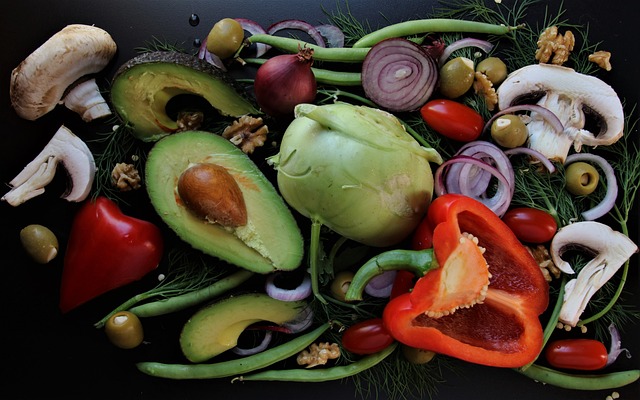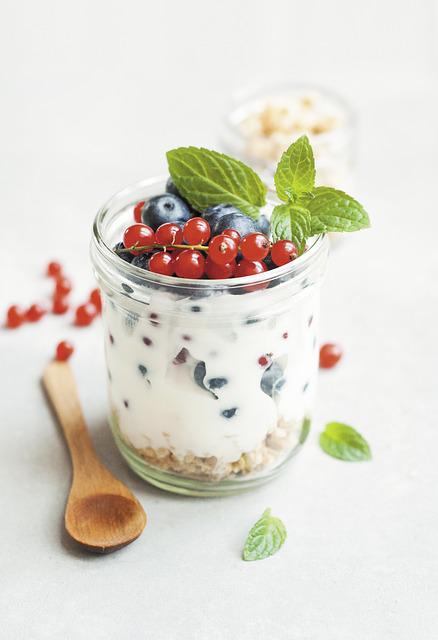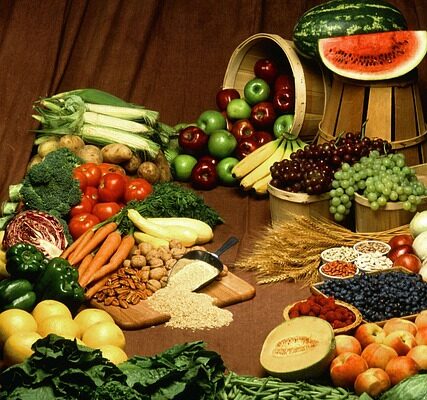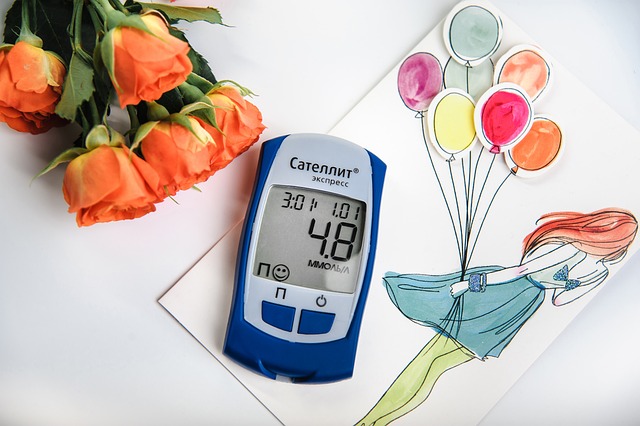In this vegetarian diabetes diet, we include lots of plant-based proteins, as well as fiber-rich nutrients (think legumes, fruits and vegetables, and whole grains) to keep you feeling content and your blood sugars—and energy levels—balanced all day.
Eating quality high-fiber carbohydrate choices (whole grains, legumes, fruit, and starchy vegetables) along with a robust protein intake at each meal is the key to good blood sugar control. This combination of protein and fiber at each meal aids digestion, slowing the rate at which glucose enters your circulation. As a result, you’re less likely to have extreme blood sugar spikes and energy swings in the short run, which has a good long-term influence on your general health.
We set this diet at 1,500 calories per day since weight reduction can help improve blood glucose. Most people will lose 1 – 2 pounds each week at this level. If you have different calorie requirements, we created variations for 1,200 and 2,000 calories per day.
The Health Advantages of a Vegetarian Diet for Diabetes
Eating a well-balanced vegetarian diet provides numerous health benefits, especiially for diabetes. Individuals who consume more plant-based meals are more likely to meet their daily fiber needs, which is a vital component that most of us are deficient in.
Those who focus on plant-based proteins have better blood sugars, lower body weights, better heart health, and even a lower risk of some malignancies, which is likely due to greater fiber intake.
Do you want to consume more plant-based meals but aren’t sure if you want to become a vegetarian? The flexitarian diet is a terrific alternative, and adding plant-based meals will still provide health benefits.
Diabetes-Friendly Vegetarian Foods
Incorporate enough protein, high-fiber foods, and healthy fats in your diet to improve your health and regulate your blood sugar levels.
- Lentils with beans
- Natural nut butter with nuts and seeds (look for options with no added sugar)
- Yogurt
- Kefir
- Cheese
- The cottage cheese
- Tofu
- Seitan
- Tempeh
- Edamame
- Hemp, flax, and chia seeds
- Whole grains and eggs (oats, quinoa, bulgur, barley, sprouted bread)
- Dark leafy greens and other vegetables
- Fruits, particularly berries and skinned fruits (such as apples and pears)
- Olive oil with olives
- Avocado
How to Cook-Food Planning for the Week:
Prepare Muffin-Tin Omelets with Bell Pepper, Black Beans, and Jack Cheese for breakfast all week.
Make a Vegan Kale Caesar Salad with Tofu Croutons for lunch on Days 2–5.
Make some Maple Granola to snack on during the week.
Day 1
Breakfast: (329 calories, 30g carbohydrate)
cup of plain low-fat Greek yogurt
1/4 cup berries
1 cup Maple Granola
Snack in the morning: (206 calories, 7g carbohydrate)
1/4 cup unsalted dry-roasted almonds
Lunch: (304 calories, 40g carbohydrate)
1 serving of Green Goddess Salad with Chickpeas
Afternoon Snack: (187 calories, 11g carbohydrate)
3/4 cup plain low-fat kefir
8 dried walnuts halves
Dinner: (476 calories, 48g carbohydrate)
1 Charred vegetable and bean tostada with lime crema
2 cups mixed greens with Citrus Vinaigrette
Total daily calories: 1,502; protein: 80g; carbohydrates: 137g; fiber: 34g; fat: 77g; sodium: 1,386mg
To get 1,200 calories, do the following: Modify the morning snack to 1/4 cup of blueberries and leave out the walnuts for the afternoon snack.
To get to 2,000 calories, do the following: Add 1 medium apple with 1 1/2 tablespoons natural peanut butter to lunch, 15 dry walnut halves as an afternoon snack, and 1/2 an avocado, sliced, to supper.
Day 2
Breakfast: (268 calories, 36g carbohydrate)
1 serving of Muffin-Tin Omelets with Bell Pepper, Black Beans, and Jack Cheese
Snack in the morning: medium pear (200 calories, 18g carbohydrate)
1 cup edamame (pods)
Lunch: (405 calories, 19g carbohydrate)
1 portion of Vegan Kale Caesar Salad with Tofu Croutons
Afternoon Snack: (187 calories, 14g carbohydrate)
1 cup plain low-fat Greek yogurt
1/4 cup fresh blueberries
Dinner: (453 calories, 37g carbohydrate)
1 serving of Greek Vegetarian Stuffed Zucchini
1 cup of Guacamole Chopped Salad
Totals for the day: 1,512 calories, 84 grams of protein, 125 grams of carbohydrates, 39 grams of fiber, 80 grams of fat, and 1,571 milligrams of sodium
To get 1,200 calories, do the following: Modify the A.M. snack to 1 peach and leave out the yogurt for the P.M. snack.
To get to 2,000 calories, do the following: Lunch should have 1 medium apple with 2 tablespoons of natural peanut butter, and the afternoon snack should include 1/4 cup dry-roasted unsalted almonds.

Day 3
Breakfast: (268 calories, 36g carbohydrate)
1 serving of Muffin-Tin Omelets with Bell Pepper, Black Beans, and Jack Cheese
Snack for morning: medium pear A.M. (126 calories, 16g carbohydrate)
1 cup plain low-fat kefir
14 cup berries
Lunch: (405 calories, 19g carbohydrate)
1 serving of Vegan Kale Caesar Salad with Tofu Croutons
Afternoon Snack: (200 calories, 18g carbohydrate)
1 cup edamame (pods)
Dinner: (485 calories, 47g carbohydrate)
1 serving of Curry Bowl with Roasted Chickpeas
2 cups mixed greens with Citrus Vinaigrette
Totals for the day: 1,484 calories, 76 grams of protein, 136 grams of carbohydrates, 40 grams of fiber, 75 grams of fat, and 1,769 milligrams of sodium
Making it 1,200 kilocalories: Decrease the edamame in pods to 1/3 cup for the afternoon snack and leave out the mixed greens with Citrus Vinaigrette for dinner.
To get to 2,000 calories, do the following: Add 1/4 cup dry-roasted unsalted almonds to your morning snack and 1 medium apple with 2 tablespoons of natural peanut butter to your lunch.
Day 4
Breakfast: (329 calories, 30g carbohydrate)
1 cup plain low-fat Greek yogurt
1/4 cup berries
1 cup Maple Granola
Snack in the morning: (223 calories, 8g carbohydrate)
2 medium celery stalks
2 tbsp. unsweetened peanut butter
Lunch: (405 calories, 19g carbohydrate)
1 serving of Vegan Kale Caesar Salad with Tofu Croutons
Afternoon Snack: (114 calories, 15g carbohydrate)
1 cup fresh blackberries
4 dried walnuts halves
Dinner: (439 calories, 40g carbohydrate) (439 calories, 40g carbohydrate)
1 cup Greek Salad with Edamame
1 oz. whole-wheat baguette
Total daily calories: 1,510, 77g protein, 114g carbohydrate, 34g fiber, 86g fat, 1,423mg sodium
To get 1,200 calories, do the following: Modify the morning snack to 1 plum and skip the baguette at dinner.
To get to 2,000 calories, do the following: Increase the A.M. snack to 3 stalks celery and 2 1/2 tablespoons natural peanut butter, add 1 large pear to lunch, and increase the P.M. snack to 20 dried walnut halves plus swap. For dinner, substitute 1 serving of Everything Bagel Avocado Toast for the bread.
Day 5
Breakfast: (268 calories, 36g carbohydrate)
1 portion of Muffin Tins Omelets with Bell Pepper, Black Beans, and Jack Cheese
Snack for morning: (200 calories, 18g carbohydrate)
1 cup edamame (pods)
1 medium pear
Lunch: (405 calories, 19g carbohydrate)
1 serving of Vegan Kale Caesar Salad with Tofu Croutons
Afternoon Snack: (168 calories, 26g carbohydrate)
1 cup plain low-fat kefir
1 peach, medium
Dinner: (458 calories, 47g carbohydrate)
1 portion Quinoa-Black Bean Salad
Meal-Prep Tip for Quinoa-Black Bean Salad: Set aside two servings. On days 6 and 7, eat a quinoa-black bean salad at lunch.
Total daily calories: 1,500, 76g protein, 146g carbohydrate, 37g fiber, 72g fat, 1,393mg sodium
Making it 1,200 calories: replace the A.M. snack with 1 plum and leave out the kefir at the P.M. snack.
To get to 2,000 calories, do the following: Lunch should have 1 medium apple with 2 tablespoons of natural peanut butter, and the afternoon snack should include 1/4 cup dry-roasted unsalted almonds.
Day 6
Breakfast: (268 calories, 36g carbohydrate)
1 serving of Muffin-Tin Omelets with Bell Pepper, Black Beans, and Jack Cheese
Snack for morning: 1 medium pear A.M. (145 calories, 12g carbohydrate)
3/4 cup plain low-fat Greek yogurt
1/4 cup fresh blueberries
Lunch: (458 calories, 47g carbs)
Snack for afternoon: (99 calories, 11g carbohydrate)
3/4 cup fresh blackberries
4 halved dried walnuts
Dinner: (541 calories, 41g carbohydrate)
1 cup Chinese Crispy Noodles with Tofu and Peanut Sauce

Total daily calories: 1,512, 70g protein, 147g carbohydrate, 30g fiber, 78g fat, 1,140mg sodium
To get 1,200 calories, do the following: Omit the pear at breakfast, the yogurt at lunch, and the plum at dinner.
To get to 2,000 calories, do the following: Add 1/4 cup dry-roasted unsalted almonds to your morning snack and 1 medium apple with 2 tablespoons of natural peanut butter to your lunch.
Day 7
Breakfast: (329 calories, 30g carbohydrate)
1 cup plain low-fat Greek yogurt
14 cup berries
1 cup Maple Granola
Snack in the morning: (200 calories, 18g carbohydrate)
1 cup edamame (pods)
Lunch: (458 calories, 47g carbs)
Afternoon Snack: (154 calories, 5g carbohydrate)
20 unsalted dry-roasted almonds
Dinner: (362 calories, 38g carbohydrate)
1 serving of Chopped Power Salad with Creamy Cilantro Dressing for Vegetarians
Total daily calories: 1,503 calories, 74g protein, 139 g carbohydrate, 34g fiber, 75g fat
To get 1,200 calories, do the following: Modify the morning snack to 1/4 cup of blueberries and the evening snack to 1 plum.
To get to 2,000 calories, do the following: Lunch should have 1 medium apple with 2 tablespoons of natural peanut butter, and dinner should include 1 plate of Everything Bagel Avocado Toast.
To Conclude
A vegetarian diet will mostly likely will not heal your Diabetes. Yet, it may provide certain advantages over a nonvegetarian diet. For example, it may aid with weight control, lower the risk of several diabetes-related problems, and increase insulin sensitivity. Even if you are not a diabetic, you should try the dishes we mentioned above for vegetarian diet recipes for diabetes. They are not only healthy, but they are also delicious.

